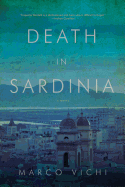
Inspector Bordelli, the protagonist of Marco Vichi's Death in Sardinia, is conflicted. It's December 1965, and he's realizing that the war, which still vividly haunts him, is a distant memory to the youth of today. He's also acknowledging that, at 55, he's growing old, and thus tries to quit smoking.
His anti-smoking plans are interrupted by the stress of a new case: a man found dead, a pair of scissors stuck into the back of his neck. He was a notorious loan shark, and countless residents of Florence had reason to want him dead. Bordelli is supposed to be finding Badalamenti's killer, but he finds himself sympathizing with the person who eliminated such a nasty man.
Meanwhile, Bordelli's usual partner, Piras, is recuperating in Sardinia, after being shot in the line of duty. Piras's holiday convalescence takes an interesting twist. however, when he begins to suspect that an apparent suicide in the village wasn't a suicide at all.
Death in Sardinia, the third of Vichi's Inspector Bordelli novels to be published in the United States, mixes modern Italian history, two interesting murders and ponderings on the massive cultural shift that took place in the 1960s, filtering the tumultuous decade through Bordelli and his somewhat antiquated views on loyalty, patriotism and family. Fans of Andrea Camilleri, Donna Leon or Conor Fitzgerald are sure to enjoy Death in Sardinia. --Jessica Howard, blogger at Quirky Bookworm

